INSIDE ISSUE 18.32 | AUG. 9, 2019
 NEWS: S.C. residents want something done on guns
NEWS: S.C. residents want something done on guns
NEWS BRIEFS: Historic S.C. stump to host Democratic presidential candidates
COMMENTARY, Brack: #PayItForward with #RandomActsOfKindness
SPOTLIGHT: WREN
MY TURN, SPECIAL: 2020 overview of South Carolina politics
FEEDBACK: Send us your thoughts
MYSTERY PHOTO: Rusty gate
S.C. ENCYCLOPEDIA: Nina Littlejohn
BIG STORY: S.C. residents want something done on guns
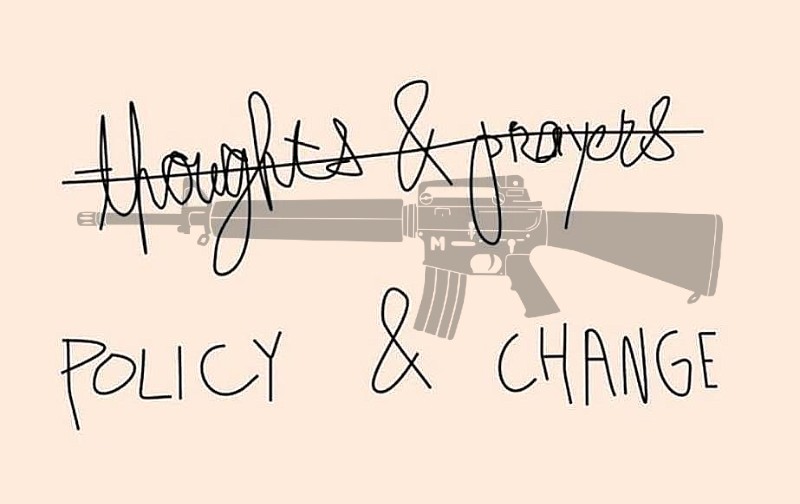
By Lindsay Street, Statehouse correspondent | With school starting in two weeks, Hilton Head Elementary first-grade teacher Laura Horton doesn’t have a lot of time to think about the next mass shooting.
Amid the half-unpacked boxes of classroom supplies, just days after the nation witnessed two deadly mass shootings in Dayton, Ohio, and El Paso, Texas, the Costa Rican-born mother of three said without state or national action, gun violence will likely continue.
“It’s scary. No matter where you are, you’re doing your daily chores for life, and then somebody who has a problem …” she said, trailing off. “Somehow here, I try not to think about it. It’s a harsh reality.”
Statehouse Report this week spoke to seven South Carolinians from a variety of backgrounds on the record for this story. Each said there should be some sort of stricter gun control or enforcement. Six out of the seven said the state and country should also focus on improving mental health services. Despite two being immigrants and three being minorities, none mentioned proposals to make hate crimes illegal.
So far in addition to warming Republican talks of expanded background checks, there is a federal, bipartisan bill that seeks to enable states to seize guns from people believed to be a danger to themselves or others.
South Carolina’s U.S. Sen. Lindsey Graham, a Republican, this week said he would introduce “red flag” legislation with Sen. Richard Blumenthal, D-Conn. The program would create a federal grant program to encourage states to adopt “red flag” laws. The proposal reportedly has earned support from President Donald Trump, a Republican.
There is no such legislation, proposed or enacted, in South Carolina. However, law enforcement officials seized the guns from the home of a teenager accused of making racist comments and violent threats at a Catholic private school in Columbia. It is unclear whether the seizure is a part of evidence or a proactive measure.
At the Statehouse
Democratic lawmakers in South Carolina this week called on the General Assembly’s Republican leaders to convene a special session to address gun violence. But it appears any work will have to wait until 2020. GOP leaders did not return requests for comment on whether they would consider a special session. The State newspaper called it “unlikely.”
![]() There are about a dozen of firearms-related bills currently being mulled at the Statehouse, with half looking to curb gun violence and the other half looking to expand gun ownership rights.
There are about a dozen of firearms-related bills currently being mulled at the Statehouse, with half looking to curb gun violence and the other half looking to expand gun ownership rights.
When state lawmakers return in January, senators will consider final reading of a bill that would make it legal to carry a concealed handgun in the state without a permit (S. 139). The bill has already received second reading in the Senate. If passed, it will need to get approval in the House.
Other bills calling for expansion of gun rights include:
- Allowing clerks of court to carry concealed weapons on duty (H. 3073);
- Allowing concealed weapon permit holders to carry on church property, and make it so the church is not held liable in the event of an incident (H. 3774); and,
- Reciprocating all out-of-state concealed weapons permits (H. 4314).
Bills calling for gun control so far in 2019 session include:
- A “school safety fund” (H. 3109) that would charge a 7 percent fee on the sale of handguns to provide for school resource officers;
- Lizzy’s aw (H. 3683), which is a proposal that would mandate the reported loss or theft of a firearm;
- Several bills (S. 154, H. 3248) that would require a 10-day mandatory reporting of criminal cases to state law enforcement (also known as closing the “Charleston loophole”);
- A ban on assault weapons and high-capacity magazines (H. 3206); and,
- A mandatory national background check for any sale, exchange or transfer of a firearm (H. 3059).
None of those bills, either limiting or expanding gun ownership, have made it out of committee.
According to gun-control advocacy group Giffords Law Center, South Carolina received an F for its gun policies. The group ranked the state 30th out of 40 for gun law strength and 12th for top gun deaths in the nation. Texas also received an F. Ohio received a D.
Another gun-control advocacy group has listed 39 mass shootings incidents — where four or more people, not including the shooter, are injured or killed — in South Carolina since 2014.
Richland County Sheriff Leon Lott said Thursday that South Carolina needs hate crime legislation, especially in light of a recent case against the former Cardinal Newman high school student. Two House bills that would add such a statute have languished in committee since January.
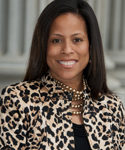
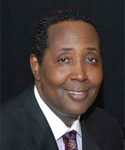
S.C. Rep. Mia McLeod, D-Richland, and S.C. Sen. Darrell Jackson, D-Richland, said this week they would push for hate crime legislation in 2020. The proposed bill by McLeod would also mandate that teachers and school administrators would have to report all threats to law enforcement.
“The time to act is now, not after the next tragedy,” Jackson said in a press release. “When I introduced the first hate crime legislation in South Carolina over 20 years ago, I knew it would be a difficult conversation to have. Now, as targeted terror rattles our country yet again, I’m urging my colleagues to join me in passing a common-sense bill.”
‘Do something’
In a 2018 reader survey about 2019 legislative priorities, more than a quarter of respondents listed gun control as a top priority. Closing the so-called Charleston loophole — which would delay gun purchases for some buyers and has been linked to the 2015, race-motivated Charleston church massacre — was among the top actions sought in 2019 by readers.
“Strengthening our gun violence laws to prevent domestic violence murders and mass shootings,” a respondent wrote.
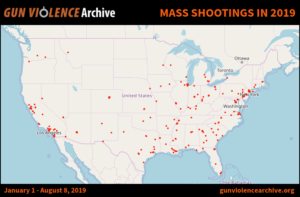 “Do something” has become a rallying cry after a deadly weekend that claimed 31 lives — including one of the alleged gunmen — and injured nearly 50 in two separate mass shootings. The chant has been launched at protest events — usually by liberals protesting federally elected Republicans — but its sentiment appears to resonate with some in the state.
“Do something” has become a rallying cry after a deadly weekend that claimed 31 lives — including one of the alleged gunmen — and injured nearly 50 in two separate mass shootings. The chant has been launched at protest events — usually by liberals protesting federally elected Republicans — but its sentiment appears to resonate with some in the state.
“We’ve got to stop finger-pointing and the political whatever, and come together and start talking,” B.J. Love of Hilton Head Island said. “Let’s quit fighting for political means and just do it.”
On Wednesday, Love was sitting at a waterfront cafe with her husband, Anderson Love.
“I feel less safe,” B.J. Love said, adding that she thinks about avoiding crowds and worries about the safety of her grandson at public school. “I look around and it’s on my mind: Who is going to spring up on this sidewalks with a gun?”
She wants to take her grandchildren to Disney World later this year, but that’s a big, public space. She said she’s worried.
“You have a fear for your children,” Anderson Love said. The couple is black, but they don’t feel it’s a race issue with white people targeting minorities, as may have been the case in the El Paso shooting and with the 2015 Charleston church shooting.
The couple said they believe removal of God from public schools and the infiltration of “the characters of Satan” have lead to more increased shootings. Both are U.S. Army veterans.
Anderson Love said politicians need to “choose the path of listening to God” and bring prayer back to public spaces like schools.
“You took God out of the equation. What happens? We have massacres,” he said.
Don Weiskerger of Mullins, who owns Liberty Guns, also cited a “break-down in society.” He said “removal” of God, and a lack of respect for others has led to the increase in violence in the nation.
Weiskerger said curbing gun violence will come from enforcing current laws and increasing funding and programs for the mentally ill.
“It’s time we take mental health seriously,” he said, adding that many of the mass shooters appear “crazy.”
B.J. Love said she wants a mixture of funding mental health and limiting who can have access to what weapons, adding civilians don’t need access to weapons of war. Latina teacher Horton agreed.
“Those guns should not be allowed to anybody,” she said.
Wayne Markham of Ridgeville said there is a need for “stricter gun laws.”
“But even if we had stricter gun laws, people are still going to be able to get a hold of guns but if you got more good people that have guns that know how to use those guns and they’re carrying them around then I think you’re going to have less problems with a bad guy,” he said, but he added that he was surprised the El Paso shooter was able to gun down so many in a state where he assumed “everyone has guns.”
He said he hadn’t thought about what types of gun control laws would work.
Restaurant owner and French immigrant Philip Feret of Hilton Head Island acknowledges that gun ownership is a part of the Constitution.
“But it was written a long time ago,” he said. “You have to be trained (to handle deadly weapons).”
Feret said he would like to see a weapons registry to help crack down on illegal transfers of weapons.
A rising high school senior who spoke to Statehouse Report said mass shootings are “not surprising,” but he added that maybe one day something would curb the violence. He saw mass shootings as part of the country’s gun rights, calling it a “grim reality” that he must face with his peers.
- Have a comment? Send to: feedback@statehousereport.com
NEWS BRIEFS
Historic S.C. stump to host Democratic presidential candidates
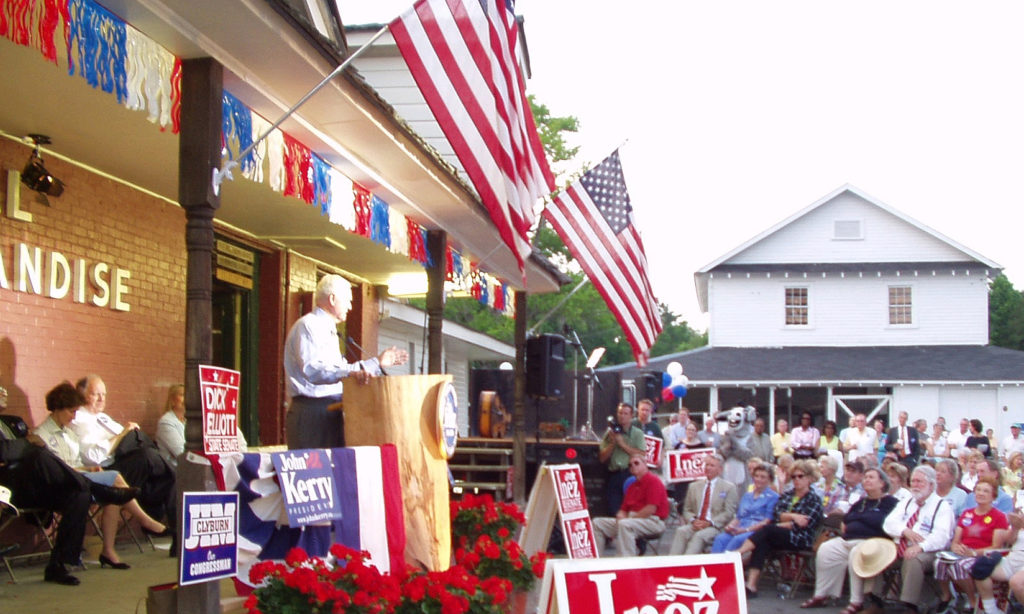
Staff reports | The historic Galivants Ferry Stump will hold its first-ever political speaking gathering featuring Democratic presidential candidates in just over five weeks.
Former Vice President Joe Biden was first to confirm for the event, which will start at 5 p.m. Sept. 16 at Pee Dee Farms General Store, 125 West Highway 501, in Galivants Ferry, S.C. Other candidates are expected to confirm in the coming weeks, according to a press release.
In past South Carolina political lore, the “stump” meeting referred to a pre-microphone time when politicians promoted their platforms by “allegedly giving speeches while standing on tree stumps,” according to the South Carolina Encyclopedia. The Galivants Ferry Stump, a Democratic Party tradition for 143 years, has been put on by four generations of the Holliday family at its Galivants Ferry store.
The stump, usually held biennially in the spring of election years, has added this new event for present presidential hopefuls prior to the South Carolina Democratic Primary election in February 2020. As the “first in the South” primary, South Carolina attracts widespread national attention, and the Galivants Ferry Stump, which often draws crowds of more than 1,000 people, provides the ideal venue for candidates to meet with voters and discuss important issues.
The 2019 event will follow the traditional festival format with live bluegrass music, country cuisine and clogging starting at 5 p.m. Political speeches will begin at 6 p.m. Although past keynote speakers have included many national political figures, organizers said the 2019 stump will be the first time that presidential candidates will speak directly to South Carolina voters at the event.
The event is free and open to the public.
In other news:
![]() PSC hires, then fires utility-tied consultant. South Carolina’s utility regulator, the Public Service Commission, hired Pegasus Global Holdings to consult on the price of solar generation — a key component of the Energy Freedom Act that could have a big impact on the state’s future energy generation. But the consultant had deep ties to big utilities, and the solar industry objected. So then, the PSC got rid of the firm. Read more.
PSC hires, then fires utility-tied consultant. South Carolina’s utility regulator, the Public Service Commission, hired Pegasus Global Holdings to consult on the price of solar generation — a key component of the Energy Freedom Act that could have a big impact on the state’s future energy generation. But the consultant had deep ties to big utilities, and the solar industry objected. So then, the PSC got rid of the firm. Read more.
McMaster brings on seasoned education adviser. S.C. Education Oversight Committee Director Melanie Barton will begin as Gov. Henry McMaster’s senior education adviser Sept. 3. Read more.
S.C. ranked near last for health care. In a new study comparing health care cost, access and outcomes, South Carolina ranked 48th out of 50. Read the study.
State lawmakers’ summit. Some S.C. lawmakers traveled this week to Nashville for the annual meeting for the National Conference of State Legislatures. The summit held meetings on redistricting, electric vehicles, and rural economies. One of the biggest crowds, according to the conference, was a talk on marijuana and state revenues. “The Straight Dope on Marijuana Revenues” reported that Washington state raked in $319 million in one year from marijuana sales. Read more.
State to spend $20M exploring sale of Santee Cooper. S.C. Department of Administration recently hired an investment bank, law firm and two energy consultants as it works to solicit, field and evaluate offers for Santee Cooper. The agency has $20 million to spend on the consultants, including $15 million from Santee Cooper itself. Read more.
2020 candidate calendar
Throughout the campaign season, we are working to keep South Carolina informed of candidate events in the state. Have an event you want us to know about? Email us at 2020news@statehousereport.com.
- Pints and Politics with Amy Klobuchar. The Post and Courier politics team will host Democratic candidate U.S. Sen. Amy Klobuchar of Minnesota 2 p.m. Aug. 17 at Tradesman Brewing in Mount Pleasant.
- Have a comment? Send to: feedback@statehousereport.com
BRACK: #PayItForward with #RandomActsOfKindness

By Andy Brack, editor and publisher | With all of America’s turmoil, you might feel discouraged. Worn down. Like there’s nothing you can do that will really make a difference because the system is so big that whatever you do just won’t matter.
 Not true. You can make a difference. But you might want to think a little closer to home. More than three dozen Facebook friends this week offered advice on ways to cure feelings that that you can’t be agents of change.
Not true. You can make a difference. But you might want to think a little closer to home. More than three dozen Facebook friends this week offered advice on ways to cure feelings that that you can’t be agents of change.
Say “please,” “thank you” and “hello” to strangers, one high school buddy shared. “Open and hold doors, help senior citizens with shopping and rides, volunteer for children’s programs and sports. Smile and have a positive attitude. Set a good example and let others see it.”
Retired advertising executive Peter Wertimer of Charleston added, “Volunteer to work pro bono for a worthy cause of some kind. Think about someone or something other than yourself or your own complicated life for awhile.”
A Columbia friend added, “This seems so simple, but I try to always compliment strangers as much as possible.”
Another guy chimed in, “Say ‘good morning’ to your spouse, coworkers and strangers. Hold the door for people. Ask people how things are going and see if you can help them in any way. Be a friend.”
In other words, engage with people you don’t know or who don’t look like you. Acknowledge their existence and show we’re all in this together. Brighten someone’s day.
Or simply inspire them, as one former state representative shared: “I told a little Latino girl this morning I hoped she would become President of the United States one day,”
West Ashley carpenter Michael Kaynard saw an employee in a big box store give a hug to a co-worker — and then to him. “Everyone had a big smile on their face. This act probably made a big impact on how we all felt the whole day.”
This is not huge, systemic change, but it makes people in communities feel more connected.
Other friends offer suggestions for intentional acts of kindness, as evidenced by one Atlanta runner: “I bring a reusable bag and EVERY DAY pick up 30 to 40 bottles and cans off the street and get them back into secondary use.”
“Ride local transit,” Mount Pleasant lawyer William Hamilton suggests. “You’ll meet people and find new ways to connect in your community. It’s cheap and fun.”
Tom Johnson, executive director of Magnolia Plantation and Gardens in Charleston, said a lot of good never gets reported. His attraction, for example, is responsible for about $500,000 of related “giving” to the community each year through free tickets to people who donate blood or collect food, and free memberships to those who adopt pets. “I bet a lot of other companies are contributing more to the common good than we are aware of. Bad stuff makes the news.”
Others intentionally “pay it forward” by paying anonymously for something for someone.
“I pay for person’s fast food in line behind me in the drive through,” one college friend explained. “Give a $20 to the cashier at the grocery store to help offset the bill of the person behind me l and walk away quickly so I get no credit. Pay for young couple’s dinner at nicer restaurants when it looks like a stretch for them.”
Several people suggested becoming a guardian ad litem — a legal advocate for children in trouble. There’s some legal training involved, but it’s hugely rewarding, former reporter Bill Steiger of Tampa, Fla., shared: “The best part about being a guardian ad litem … is the chance to make a one-on-one positive difference in a child’s life. Yes, I could give money to a charity or maybe serve meals to the homeless — all great gestures — but to sit down every month with a child and form a bond and help them solve problems, or just be a friend at a very traumatic time in their lives, is truly special.“
Columbia public relations executive Ashley Hunter has been a guardian for 15 years. “It is hard; it is emotional many times. But some days, you also see a happy ending for these children and these families.”
Pay it forward. Commit random acts of kindness. Or just be kind, intentionally.
- Andy Brack’s latest book, “We Can Do Better, South Carolina,” is now available in paperback and for Kindle via Amazon.
- Have a comment? Send to: feedback@statehousereport.com.
SPOTLIGHT: WREN
 The Women’s Rights and Empowerment Network (WREN) is a South Carolina-based nonpartisan network created to build a movement to advance the health, economic well-being, and rights of South Carolina’s women, girls, and their families. WREN provides a strong, collective voice for South Carolina’s women and girls.
The Women’s Rights and Empowerment Network (WREN) is a South Carolina-based nonpartisan network created to build a movement to advance the health, economic well-being, and rights of South Carolina’s women, girls, and their families. WREN provides a strong, collective voice for South Carolina’s women and girls.
With its partners and members:
WREN advocates at the Statehouse for policies and laws that will improve the status of women.
WREN educates the public on issues that affect women and girls and seeks to inspire action.
WREN empowers people and strengthens organizations to support women and young people.
WREN builds coalitions of people and organizations committed to improving opportunities in South Carolina.
WREN convenes diverse voices, collects and disseminates research, and shares information about practical solutions to promote gender equality and improve our state’s health and economic vitality.
- To learn more, visit WREN online at: http://www.scwren.or
SPECIAL: 2020 political overview of South Carolina
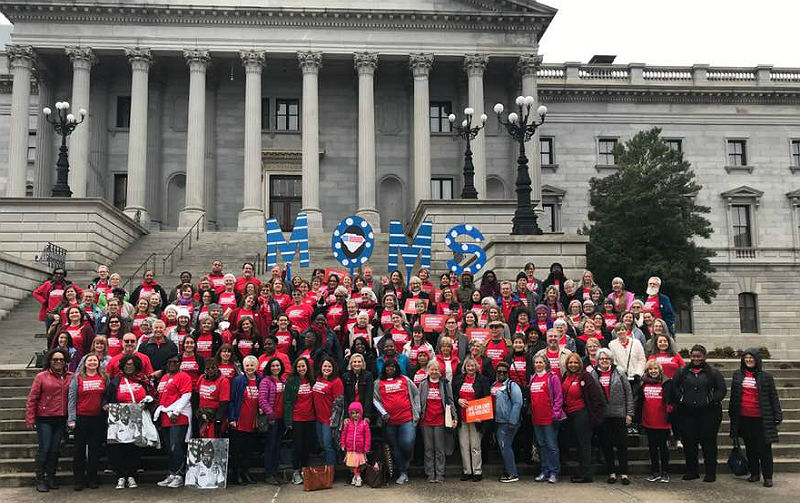
Editor’s Note: The following article on South Carolina politics is part of the newly-published 2020 edition of the Almanac of American Politics. We have partnered with the Almanac to provide it to our readers to give a general overview of what’s ahead in S.C. politics in the coming year.
By Louis Jacobson, copyrighted material republished with permission | History is inescapable anywhere, but especially so in the South — as Americans have been reminded in recent years, when South Carolina has repeatedly been vaulted into the headlines for tragic incidents and efforts at reconciliation.
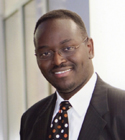
In 2015, a gunman with a history of white supremacist beliefs entered a historic African-American church in Charleston, sat down for Bible study, and then systematically gunned down nine black worshippers — including the pastor, state Sen. Clementa Pinckney – as he squeezed the trigger more than 75 times. Amid the mourning, a debate about an old subject — race and Confederate heritage— reemerged. Critics said the state should finally do what it had previously balked at — remove the Confederate battle flag from the state capitol grounds in Columbia, where it had flown, in one way or another, since the depths of the civil rights conflict in 1962. Republican Gov. Nikki Haley, who prior to the killings had shown little interest in following her predecessors’ (failed) efforts to pull down the flag, offered her support for removal, and the tide began to turn. The legislature gave its approval, and on July 10, 2015, the flag was lowered from the statehouse grounds for good. The shooter, Dylann Roof, was sentenced to death in 2017 — the nation’s first federal hate-crime defendant to face the death penalty. Meanwhile, another high-profile case – a videotaped police shooting in North Charleston in which a black man, Walter Scott, was shot in the back by a white police officer –produced first a deadlocked jury and then a plea agreement that resulted in a 20-year prison sentence.
In reality, tragedy and coexistence have been dueling parts of South Carolina’s history from the beginning. The state’s early influence was the slave-majority, sugar-producing island of Barbados, which produced its original settlers; until 1855, South Carolina was the only southern colony or state with a black majority. On the one hand, Carolina plantation owners were tolerant of some groups, opening their colony to French Huguenots and Sephardic Jews. At the same time, they were also slave masters of giant plantations that produced rice and indigo. Indeed, the predecessor of the very same church where the 2015 shootings occurred was the epicenter of the 1822 slave rebellion led by Denmark Vesey, which ended with the execution of Vesey and numerous lieutenants, as well as the destruction of the church. (Before his death, Pastor Pinckney had been active in erecting a memorial to Vesey.) South Carolinian Charles Pinckney led the effort to enshrine the principle of no religious tests for political office in the Constitution; he was also a slaveholder. The Lowcountry planters maintained control of the legislature, and therefore the state’s two Senate seats and presidential electors, up through 1860. In that year and the next, South Carolina did more than any other state to precipitate the Civil War. In December, after the election of Abraham Lincoln, the South Carolina legislature voted to secede from the Union and was soon followed by other states. And in April 1861, a cannon in Charleston fired on Union troops at Fort Sumter.
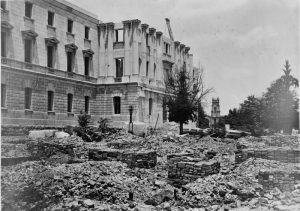
Defeat in the Civil War transformed South Carolina. The state’s slaves, 57 percent of the population in 1860, were freed. One of the wealthiest states became one of the poorest. Some 30 percent of military-age white males were killed. Reconstruction briefly gave black Republicans political control, but the backlash was fierce once federal troops left; strict racial segregation and voting restrictions, including the poll tax, kept most South Carolinians disenfranchised. As late as 1944, in a state of 2 million people, only 103,000 voted for president, with 88 percent of them voting Democratic. The Lowcountry languished in poverty, with malnutrition on coastal islands. A silver lining was architectural — the old mansions of Charleston were not replaced by commercial buildings, and instead were saved by the nation’s first local historic preservation movement (and rebuilt after Hurricane Hugo in 1989), cementing the city’s culture and civic pride. Mostly white Upstate South Carolina, with a growing textile industry, took the political lead, led by such politicians as Pitchfork Ben Tillman (governor 1890-94, senator 1895-1918) and a close friend’s son, Strom Thurmond (governor 1947-51, senator 1954-2003).
In the last few decades, this once underdeveloped state has taken steps forward. Most South Carolina whites opposed integration, but unlike in Alabama and Mississippi, the effort was mostly not punctuated by violence. The Civil Rights Act of 1964 and the Voting Rights Act of 1965 ended legal segregation of public accommodations and workplaces and brought blacks into the electorate. Democratic (and later Republican) Sen. Thurmond, who staged a record-setting filibuster of the 1957 Civil Rights Act, began appointing black staffers and signed off on a black federal judge. By the 21st century, the state elected Haley, a daughter of immigrants from India, and then Tim Scott, an African-American, to the House and later to the Senate, respectively; in this strongly conservative state, their ideology was what mattered.
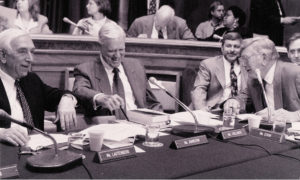
In many ways, the biggest change has been economic. Forty years ago, much of South Carolina’s economy depended on military bases and big textile mills in the Interstate 85 corridor around Greenville and Spartanburg. Then South Carolina became the most aggressive state in the South in seeking new industry. It advertised its business climate, with one of the nation’s lowest rates of unionization and taxation and a willingness to splurge on tax incentives. Crucially, Democratic Gov.(later Sen.) Ernest Hollings spearheaded the creation of the state’s technical colleges, which today educate and train hundreds of thousands of residents a year. Michelin opened the first of several South Carolina plants in 1975, and the first BMW vehicles rolled off the Spartanburg assembly line in 1992. Volvo chose a South Carolina site 30 miles northwest of Charleston as the location of its first North American assembly plant, while smaller companies built factories throughout much of central and Upstate South Carolina.
Navy bases were the mainstay of Charleston’s economy in the 1970s, but they were closed in the early 1990s, subsequently becoming a center of aircraft production, particularly after Boeing in 2009 chose North Charleston to build a plant to assemble its 787 Dreamliner. The aircraft giant now employs 6,800 people in the Charleston area, though the company has been enmeshed in a contentious battle over unionization; one major organizing effort was rejected in a vote, but a narrower one succeeded in 2018. Charleston has become a major port, which is especially helpful for the state’s international exporters; the state has scrambled to line up the funds to carry out a $558 million, multi-year plan to dredge Charleston Harbor so container ships can traverse it regardless of tidal conditions. Charleston’s downtown has not only survived but thrived, thanks in large part to the creative energy of longtime Mayor Joseph P. Riley Jr., who was first elected in 1975 and who served for 40 years. With a keen aesthetic eye, he made the city’s historic center a magnet for tourists; statewide, tourism has grown consistently, reaching $21.2 billion in 2016, an amount bigger than the $16 billion statewide impact of the military. By late 2018, the unemployment rate had fallen to 3.3 percent, slightly below the national average.
Through the 1960s, few people except military personnel moved to South Carolina. That has changed in a big way. In 2018, United Van Lines reported that South Carolina was the sixth-most popular destination for interstate moves. Since 2010, the population has grown by 9.7 percent, with growth fastest on and near the coast – 20 percent in Horry County (Myrtle Beach) and Berkeley County (the northern suburbs of Charleston), 17 percent in Dorchester County (the northwestern suburbs of Charleston), 15 percent in Beaufort County (Hilton Head), and 13 percent in Charleston County (Charleston). Another growth area has been the York County suburbs of booming Charlotte, North Carolina; it grew by 17 percent. These booming areas attract tourists and affluent retirees eager to spend days with pleasant weather on the golf course and in time-shares. The newcomers are disproportionately white and conservative; South Carolina’s population is 27 percent black (tied for the fifth highest in the nation, although far below African-Americans’ near-majority of the 1940s) and 6 percent Hispanic. The fastest-growing portion of South Carolina’s population now consists of those 85 and older, and by 2030, the state is expected to have more residents 65 and older than children in school.
 Despite the economic gains, South Carolina had no locally headquartered company on the Fortune 500 list in 2018, and business leaders worried about the impact of President Donald Trump’s protectionist trade policies. After tariffs began to hit, BMW shifted some of its production to China, and Daimler, which was building a plant in North Charleston, said it might need to follow suit; Volvo warned that it may hire fewer workers at its plant. The state’s exports fell in 2018 for the first time in years, and television maker Element Electronics near Columbia shut down entirely due to higher costs from tariffs. But the state’s Republican politicians hung with Trump for the most part, saying they hoped the approach would produce long-term gains despite short-term pain.
Despite the economic gains, South Carolina had no locally headquartered company on the Fortune 500 list in 2018, and business leaders worried about the impact of President Donald Trump’s protectionist trade policies. After tariffs began to hit, BMW shifted some of its production to China, and Daimler, which was building a plant in North Charleston, said it might need to follow suit; Volvo warned that it may hire fewer workers at its plant. The state’s exports fell in 2018 for the first time in years, and television maker Element Electronics near Columbia shut down entirely due to higher costs from tariffs. But the state’s Republican politicians hung with Trump for the most part, saying they hoped the approach would produce long-term gains despite short-term pain.
Not even the export-driven growth has managed to extinguish poverty in many areas of the state. In 2016, five whole counties and parts of several others reported more than 95 percent of their schoolchildren qualifying for free or reduced-cost lunches or Medicaid. Statewide median income is 16 percent below the national average, and the poverty rate is a few percentage points higher than the national average. South Carolina ranked in the bottom quarter of states for the percentage of residents with a college degree, and large percentages of new – and even experienced – teachers have left the state’s schools, and even the profession entirely, according to The State newspaper.
The demographic changes have moved South Carolina politically toward Republicans. Politics cleaves the electorate along racial lines, and the hard math of the population figures — whites have an easy majority — makes it difficult for Democrats to win statewide. South Carolina has voted for Republicans for president in every election but one since 1960 – in 1976, when son of the South Jimmy Carter was running. With some bare-knuckled help from wunderkind strategist Lee Atwater, former Gov. Carroll Campbell built a Republican Party capable of electing statewide officials and legislative majorities. In 1988, Campbell and Atwater, who was by then George H.W. Bush’s campaign manager, set up the early Republican presidential primary on the Saturday before Super Tuesday, which enabled Bush to clinch the nomination that year. It did the same for Bob Dole in 1996, for George W. Bush in 2000, and for John McCain in 2008. The only hiccup came in 2012, when Newt Gingrich won the state.
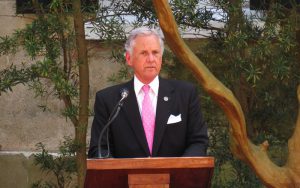
In 2016, Donald Trump won all but two counties in South Carolina’s primary, and easily won the state in the general election. South Carolinians remained supportive of the embattled president, which led such leading GOP figures as Sen. Lindsey Graham and Gov. Henry McMaster to cement close ties with Trump. Haley, as U.N. ambassador, and former Rep. Mick Mulvaney, in several White House positions including acting chief of staff, served in high-profile administration roles. Trump helped push GOP primaries toward loyalists, including a primary challenger who ousted Rep. Mark Sanford for being insufficiently supportive. That move backfired in the general election when the Democrats flipped the seat, but that race was the exception. Not even a long-unfolding investigation of Richard Quinn, a powerbroker with deep influence in the legislature who was indicted on perjury charges in April 2019, hurt Republican prospects in the state, despite several indictments of legislators and other political figures. Today, even attractive Democratic candidates find it hard to secure more than 45 percent of the vote in South Carolina.
“Copyright @ 2019 The Almanac of American Politics. This feature was provided by and is included in The Almanac of American Politics 2020 edition, which has just been released. To learn more about this publication or purchase a copy, visit www.almanacofamericanpolitics.com.”
- Have a comment? Send to: feedback@statehousereport.com.
Send us your thoughts … or rants
We love hearing from our readers and encourage you to share your opinions. But you’ve got to provide us with contact information so we can verify your letters. Letters to the editor are published weekly. We reserve the right to edit for length and clarity. Comments are limited to 250 words or less. Please include your name and contact information.
- Send your letters or comments to: feedback@statehousereport.com
Rusty gate
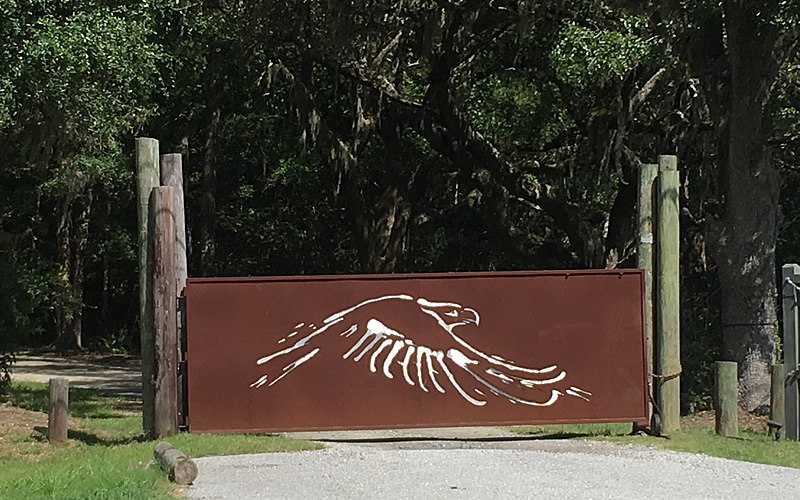
If you drive along coastal South Carolina, you’ve probably seen this rusty gate at some point. What and where is it? Send your guess about the location of this photo to feedback@statehousereport.com. And don’t forget to include your name and the town in which you live.
Our previous Mystery Photo
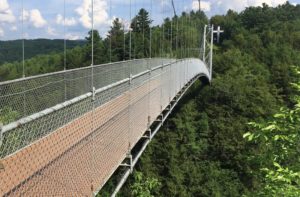 Our Aug. 2 mystery, “Bridge to somewhere,” was correctly identified by just two readers — George Graf of Palmyra, Va., and Randy Herald of Lexington. The likely reason: The suspension bridge was in at the Parc de la Gorge in Coaticook, Quebec.
Our Aug. 2 mystery, “Bridge to somewhere,” was correctly identified by just two readers — George Graf of Palmyra, Va., and Randy Herald of Lexington. The likely reason: The suspension bridge was in at the Parc de la Gorge in Coaticook, Quebec.
At one time, it was the largest suspension bridge for pedestrians in North America. But a bridge recently opened in Tennessee that reportedly is longer. Nevertheless, Graf provided this context, according to gorgedecoaticook.qc.ca: “Built by a local company Couillard Construction, the suspended footbridge is certainly the most spectacular attraction within the Park. As for the construction itself, it took place over six months, from July to December 1988. The official inauguration took place on May 29, 1989.
“Overlooking the river, it is possible to enjoy an exceptional view of the canyon and surrounding landscape. Supporting the bridge are cables of 199 meters (653 ft.) in lengths, with a diameter of 5 cm (2 in.). The bridge may hold a load of 800 people of about 90 kg (200 lbs) at the same time.”
- Send us a mystery: If you have a photo that you believe will stump readers, send it along (but make sure to tell us what it is because it may stump us too!) Send to: feedback@statehousereport.com and mark it as a photo submission. Thanks.
S.C. ENCYCLOPEDIA
HISTORY: Nina Littlejohn
S.C. Encyclopedia | Hospital administrator. Littlejohn was born on February 28, 1879, at Wheat Hill in Cherokee County. Her parents, Emanuel and Alice Littlejohn, were landowning farmers. In addition to planting crops on their vast acreage, the Littlejohns raised horses and bees. Nina married Worth Littlejohn, who lived at Near Tickety Creek. The couple moved to Spartanburg, where they built a house at 218 North Dean Street. Worth Littlejohn was a barber, and his Magnolia Street shop catered only to a white clientele. The Littlejohns had one child, a daughter.
![]() Aware that African Americans did not have access to suitable medical care, Littlejohn created the John-Nina Hospital in 1913. This hospital was the first medical facility established specifically for African American patients in Spartanburg, and the only one licensed in Spartanburg County. A member of the Spartanburg Area Chamber of Commerce, Littlejohn had political influence regarding civic programs beneficial for the hospital’s improvement. Her husband also utilized his business contacts to secure financial and community support for the hospital. Littlejohn arranged for the two-story medical structure to be constructed next to her house. Between 1913 and 1932 the John-Nina Hospital provided medical services for the area’s African American population. Patients were housed in two wards, holding a total of twenty people, and eight rooms, with a maximum occupancy of sixteen. An operating room was fitted with the most state-of-the-art surgical equipment and supplies available at that time. A backyard garden produced fresh vegetables crucial for the nutritious meals that aided patients’ healing and recovery.
Aware that African Americans did not have access to suitable medical care, Littlejohn created the John-Nina Hospital in 1913. This hospital was the first medical facility established specifically for African American patients in Spartanburg, and the only one licensed in Spartanburg County. A member of the Spartanburg Area Chamber of Commerce, Littlejohn had political influence regarding civic programs beneficial for the hospital’s improvement. Her husband also utilized his business contacts to secure financial and community support for the hospital. Littlejohn arranged for the two-story medical structure to be constructed next to her house. Between 1913 and 1932 the John-Nina Hospital provided medical services for the area’s African American population. Patients were housed in two wards, holding a total of twenty people, and eight rooms, with a maximum occupancy of sixteen. An operating room was fitted with the most state-of-the-art surgical equipment and supplies available at that time. A backyard garden produced fresh vegetables crucial for the nutritious meals that aided patients’ healing and recovery.
Aspiring to serve patients and manage staff professionally, Littlejohn took business classes at Claflin College in Orangeburg to improve her administration of the John-Nina Hospital. By 1932 Littlejohn’s hospital was absorbed by the Spartanburg General Hospital, which opened an annex for blacks. Although some denounced her support of this segregated wing, Littlejohn was not deterred and persisted in her work to improve community conditions. She wanted to set an example of independence, capability, and fortitude for Spartanburg residents, especially African Americans.
After her husband died, Littlejohn married a Mr. Hunter. She was widowed a second time prior to dying on February 28, 1963, in Spartanburg. She was buried in that city’s Lincoln Memorial Gardens.
— Excerpted from an entry by Elizabeth D. Schafer. This entry may not have been updated since 2006. To read more about this or 2,000 other entries about South Carolina, check out The South Carolina Encyclopedia, published in 2006 by USC Press. (Information used by permission.)
ABOUT STATEHOUSE REPORT
Statehouse Report, founded in 2001 as a weekly legislative forecast that informs readers about what is going to happen in South Carolina politics and policy, is provided to you at no charge every Friday.
Meet our team
- Editor and publisher: Andy Brack, 843.670.3996
- Statehouse correspondent: Lindsay Street
Buy the book
Now you can get a copy of editor and publisher Andy Brack’s We Can Do Better, South Carolina! ($14.99) as a paperback or as a Kindle book ($7.99). . The book of essays offers incisive commentaries by editor and publisher Andy Brack on the American South, the common good, vexing problems for the Palmetto State and interesting South Carolina leaders.
More
- Mailing address: Send inquiries by mail to: P.O. Box 22261, Charleston, SC 29407
- Subscriptions are free: Click to subscribe.
- We hope you’ll keep receiving the great news and information from Statehouse Report, but if you need to unsubscribe, go to the bottom of the weekly email issue and follow the instructions.
- © 2019, Statehouse Report. All rights reserved.
















 We Can Do Better, South Carolina!
We Can Do Better, South Carolina!